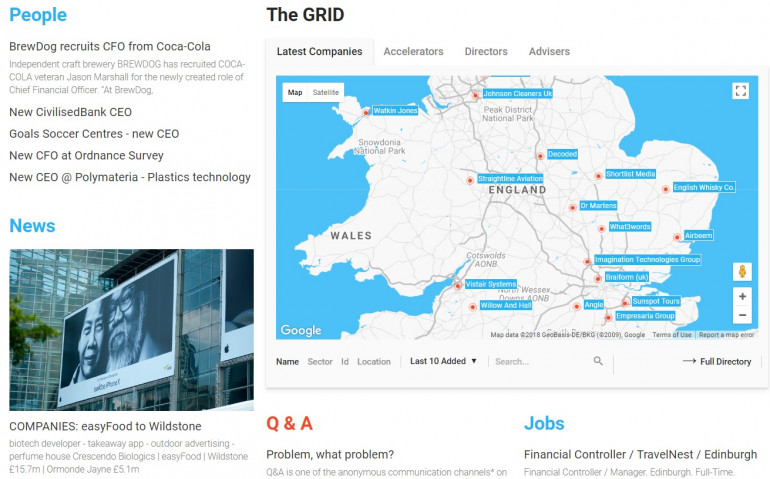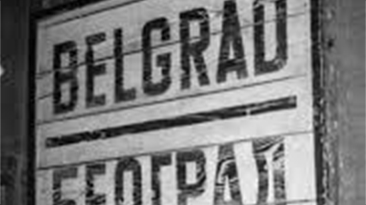Published by Directorzone Markets Ltd on March 28, 2016, 9:00 am in News, Other
Wednesday January 1st 2020

IMAGE: courtesy of MediaCom - has announcedpartnership with Realeyes
News about 12 UK growth companies and/or accelerators (turnover in brackets) in the GRID marketplace, 20th – 26th March 2016:
Petainer (£79.4m) | Eat (£99.4m) | Atlantic Healthcare | Vegware (£11.8m) | Changify | Block Dox | Multipass | Future Finance | Blue Prism (£6.1m) | Tungsten | Mercanta (£7.5m) | Realeyes
PETAINER: Keg maker plans £100m float | Daniel Dunkley, The Sunday Times. March 20.
DZ profile:
Business: Makes kegs and containers for breweries and vineyards. Operates across the globe and has factories in the Czech Republic, Sweden and Russia
ICB Classification: 2723 Containers & Packaging
Location: London
Staff: employed 350 people at the end of 2014
Financials: made an underlying profit of £9.7m on turnover of £79.4m in 2014
Investment: was part of packaging giant Rexam (FTSE 100) until November 2009, when it was sold to buyout funds Next Wave and WHEB Ventures. Rexam, which made an initial loss on the disposal, used later proceeds from the sale to pay down debt. Next Wave, which now owns 88%, is expected to offload a large chunk of its holding once the stock begins trading. Chief executive Nigel Pritchard holds a minority stake
News: is expected to go public on London’s junior AIM market for a £100m float by the end of the month and has hired stockbroker Numis to work on the deal. However, the listing could yet be derailed as a handful of private equity firms are weighing potential offers, sources said.
Sandwich chain faces £3.6m ‘pasty tax’ bill | The Sunday Times
EAT
DZ profile: Eat Limited
Business: Sandwich bar chain. Has more than 110 sites.
Launched: 1996
Founders: Niall, a former banker, and Faith MacArthur
Financials: For the 12 months to the end of June, Eat reported a £20.2m loss on turnover of £99.4m. The year before it posted a deficit of £26.4m. Remains deep in the red because of the large debts piled on to it by Lyceum since taking control in 2011. Eat’s net borrowings rose by £22m to £110m during the year, with some loans carrying an interest rate of 23.6%.
Investment: owner LYCEUM CAPITAL
News:
1. Eat has set aside £3.6m to cover its VAT tax bill after a long-running legal battle with HM Revenue & Customs over the “pasty tax” – which specifies that toasted sandwiches should be subject to the standard 20% VAT rate. It will have to borrow even more cash from its owner, Lyceum Capital, to drum up the cash.
UPDATE:
Eat chain backers swallow £94m losses | Oliver Shah and Daniel Dunkley, The Sunday Times. April 16 2017
2. Eat’s private equity backer Lyceum Capital, and the company’s founders, wrote off £94.5m in loan notes in a debt-for-equity swap in January, according to accounts.
3. Eat made a pre-tax loss of £21.1m on sales of £101.1m in the year to last June, which it said was a “challenging” period. It also lost £20.2m in the previous year. Competition is fierce in the sector, with coffee shops such as Costa, Pret A Manger and Starbucks continuing to open branches at a rapid pace, and “healthy” brands such as Itsu, Leon and Wasabi on the rise in affluent areas.
4. Lyceum bought into Eat in 2011 with a view to tripling its store estate to 300. However, it still has about 115 sites.
ATLANTIC HEALTHCARE
DZ profile:
Business: international specialty pharmaceutical company focussed on diseases of the gastrointestinal tract and Inflammatory Bowel Disease (IBD).
ICB Classification: 4577 Pharmaceuticals
Location: Saffron Walden, Essex.
Founder: Toby Wilson Waterworth, CEO
Investment: Fundraising to date includes £1.9m through SBRI funding with InnovateUK, the UK Government's innovation agency.
News: LDC, Lloyds’ private equity arm, has made a rare biotech investment by leading a $24m (£16.6m) funding round for a Cambridge-based developer of medicines for gastric diseases. LDC is investing in Atlantic Healthcare along with Lorin Johnson, the founder of Salix Pharmaceuticals, which was bought for $15.8bn last year by American giant Valeant. Johnson has also been appointed to Atlantic’s board. The company will use the proceeds to fund the Phase 3 trial of its main product, a treatment for inflammatory bowel disease.
VEGWARE: How I made it: Joe Frankel, founder | Laura Onita, The Sunday Times
DZ profile:
Business: maker of compostable packaging - makes cutlery, cups and packaging for takeaway restaurants and cafes from plant-based materials such as corn starch and sugar cane. The products are biodegradable, which means they can be recycled along with food waste. Operates in America, South Africa, Australia, New Zealand, China and Dubai. Vegware conceived as an ecommerce business. Today traditional sales have over-taken online orders and account for more than 90% of revenues. Vegware’s biggest market remains Britain, while America and the Continent are gaining ground.
ICB Classification: 2723 Containers & Packaging
Launched: 2006
Location: Edinburgh and Bristol
Founder: Joe Frankel, 40, launched Vegware with £3,000 of savings and without having a clear business plan.
Staff: 50
Financials: sales of £11.8m, which have doubled every year for the past three years, are expected to reach £14m this year. It is in profit.
Investment: The rapid growth persuaded Bradenham Partners, a venture-capital fund, to invest a six-figure sum in 2009, followed by two further injections, in return for a 20% stake. Frankel owns 40% of the business, but has no plans to sell
News: Frankel manufactures some of his designs in Britain, but he has outsourced production to Ireland, Taiwan and China. “The big guys here won’t manufacture our products because we’re seen as a disruptive company that will change the way they do things,” he said.
Meet me on the corner and we’ll make a smarter city | Kiki Loizou, The Sunday Times
CHANGIFY
DZ profile:
Business: a mobile phone app and social network that lets users upload reports and photos of problems in their area. Is trialling the app in Plymouth. The idea is that if enough locals raise the issue, the complaint starts “trending” and attracts the attention of the council.
ICB Classification: 5377 Specialized Consumer Services
Location: Camberwell, south London
Founder: Priya Prakash, 40.
Staff: 5
Investment: has received almost £30,000 of funding from the government agency Innovate UK and raised more than £50,000 from angel investors. Is about to seek £250,000 from new backers.
News:
1. Is not just interested in spreading bad news: It provides information about roadworks and public transport, and children are uploading photographs of things they enjoy on their walk to school.
2. Prakash was one of 10 entrepreneurs who travelled to Malaysia and Singapore last week with Innovate UK to showcase Britain’s skills in the smart cities sector and to learn from leaders in the field.
BLOCK DOX
DZ profile:
Business: is a patent pending platform which enhances building performance with real-time & predictive intelligence, such as occupancy data. Its apartment building app connects building users, owners and managers with the aim of improving property management worldwide. Block Dox improves management and communication within blocks of flats and apartment buildings, allowing residents and building managers to interact and communicate via a unique smartphone app. The technology monitors how many people go in and out of a building, for example, and the app allows the occupants, managers and owners to communicate and to make informed decisions about how to run it more efficiently.
ICB Classification: 8637 Real Estate Services
Launched: 2013
Location: in Camden, north London. Has also opened an office in Hong Kong.
Founder: Nicolas Shulman, 38
Staff: 10
Investment: is in talks with investors in Britain and Asia.
MULTIPASS
DZ profile:
Business: helps travellers to buy the best-value rail tickets without queuing or confusion. The system is already in place for rail travellers between London and Oxford.
ICB Classification: 5377 Specialized Consumer Services
Launched: 2013
Location: London, Oxford and Russia
Founder: Alexander Peschkoff, 48.
Staff: has 22 staff in east London and Oxford and 20 engineers in Russia.
Investment: has so far received investment of £3m, which includes grant funding from Innovate UK. It is now closing in on a further £3.5m from private investors to develop its technology and win more clients.
FUTURE FINANCE: an MBA graduate happy to stay in student debt | Jonathan Moules, FT. March 21
DZ profile:
Business: Future Finance Loan Corporation lends to students in higher education, primarily in the UK. Its first loan in May 2014 was for £2,500 to a trainee nurse at the University of Surrey. However, a significant slice — 10 per cent of the total loan book — is made to postgraduate students returning to full-time study for business and finance qualifications. For many prospective business school students the biggest barrier to taking up a place is the ability to get a loan to fund their fees and living costs while studying
ICB Classification: 8773 Consumer Finance
Launched: 2014
Location: Dublin
Founder: Chicago-born Brian Norton, co-founder, chief executive
Investment: recently announced a £119m ($171m) funding round, bringing total capital raised to £185m. Backers include QED Investors, a venture capital firm for US fintech businesses, and Goldman Sachs.
News: The company made its first loan outside the UK, in Germany, last month.
BLUE PRISM: rides the robot wave | Kate Burgess, FT. March 21
DZ profile: Blue Prism Group Plc
Business: develops virtual workforces to man back offices and call centres. Blue Prism’s software fills in forms, cross-reference data, crunch data, conduct credit checks and do the filing for clients such as TELEFÓNICA O2, BARCLAYS BANK, CO-OPERATIVE BANK, FIDELITY INVESTMENT MANAGEMENT and utility RWE Npower. One energy company call-centre now has two humans and 300 robots. Advisors such as Accenture and Deloitte sell the robots to their customers.
Launched: 2001
Location: moved the head office from Manchester to Newton-le-Willows to access investment from the MERSEYSIDE SPECIAL INVESTMENT FUND, a local private equity house that takes stakes in regional companies. Has offices in Chicago and Miami.
Founders: Alastair Bathgate, chief executive and David Moss, CTO. Bathgate ....started out in the 1980s monitoring productivity in the print industry. And in 2001, he co-founded his current company.
Financials: Sales rose from £2.95m in 2013 to £6.1m last year but pre-tax losses have widened from £250,000 to £700,000.
Investment: shares rose 44 per cent on the first day of trading on Aim last week. Raised just £21m by issuing shares at 78p, valuing the business pre-float at about £45m.
News:
1. At one utility data centre, Mr Bathgate says, 300 robots supervised by just two people assess meter readings and bills, doing the work of 600 human beings. “We are saving thousands of man-hours,” he claims. “Telefónica O2 employs 2,500 in its back office. Now a quarter of them are robots.”It is not about handing out P45s, he says, but about reallocation.
UPDATE:
Blue Prism’s rapid share price rise needs a reality check | Kate Burgess, FT. January 29, 2018
2. The company’s revenues rose 150 per cent to £25m in the year to October 2017, securing three times more contracts and new customers than the year before. Last week, the group said pre-tax losses had widened from £5.3m to £9.4m in 2017.
3....shares have risen from 78p when they floated on the Alternative Investment Market in early 2016 to nearly £14, valuing the group at about £900m. That is about 36 times last year’s revenues and 20 times sales forecast for 2019. Equivalent shares in US software-as-support-services businesses trade at nearer four times revenues. It also placed £70m of shares at £12.60. About £30m of that went to pre-float backers and executives, including Mr Bathgate, who shaved his stake from 9 to 8 per cent. Investec brokers raised revenue forecasts and said the group was “inherently cash generative”. But they now expect losses, before nasties such as tax, to worsen to £19m in 2019. Yet still Blue Prism’s shares rose.
4. Brokers at Merrill Lynch reckon the group has a 11 per cent of the “robotic process automation” market. They estimate the group’s revenues will be £100m by 2020, of which 90 per cent will be recurring. And if Blue Prism does not have to cut prices to shreds and can hold on to its share against rivals Merrill thinks Blue Prism could be turning over up to $500m of a $5bn market by 2022. But we need to spend money to get there, says Mr Bathgate. ... And that means expanding the sales force. Roughly two-thirds of Blue Prism’s revenues are spent on sales and marketing, against a tenth of turnover going on further research and development of software.
TUNGSTEN: Edi Truell thwarted in attempt to buy digital invoicing firm | Harriet Agnew, FT. March 22.
DZ profile:
Business: e-invoicing business seeks to take costs out of the global supply chain and claims to serve 56 per cent of the Fortune 500 and 67 per cent of the FTSE 100. Last year it processed transactions worth over $187bn for clients including General Motors, GlaxoSmithKline and the US Federal government.
ICB Classification: 8775 Specialty Finance
Launched: February 2012
Founder: Edi Truell. Founded private equity firm Duke Street Capital in 1998. Stepped down as chief executive of Tungsten in July 2015. In August last year Mr Truell was appointed by Mayor of London Boris Johnson as his adviser on pensions and investments and is charged with persuading local government pension funds to combine their assets in a Citizen’s Wealth Fund that will invest in infrastructure and housing in London and across the country.
Investment: Tungsten raised £160m at a £225m valuation when it floated on London’s junior market in October 2013 — the largest initial public listing on Aim since 2008. Shares began trading at 225p but have since fallen to 57.4p after investors have become frustrated with the speed at which Tungsten has signed up customers and its lack of profitability.
News:
1. Failed attempt to take over the group’s assets - Mr Truell was keen to take Tungsten private to give it the breathing space for his long-term strategy to play out. However, shareholders in the company wanted to keep it public to avoid being bought out a much lower price than the flotation. Mr Truell proposed to combine the company with various other businesses in which he has a majority interest, including Tantalum, a vehicle telematics business.
2. At an investor day in February Tungsten’s board set out a strategy to focus on digital invoicing and cut costs, with the aim of breaking even by 2017. Tungsten sold its banking unit to the Gupta family, owners of international steel and metals group Liberty House in December.
3. Mr Truell launched Tungsten with the aim of buying an existing financial services company in a high-growth industry. In 2013 it paid £99m in cash and shares for OB10, an electronic invoicing company that had accumulated losses of £52.3m since it was founded in 2000.
MERCANTA: Stephen Hurst, coffee bean connoisseur | Emiko Terazono, FT. March 23
DZ profile:
Business: specialty coffee merchants - one of Europe’s first high-end coffee traders. By focusing on long-term relationships with growers, Mercanta has clients in 40 or so countries. Mercanta also has offices and lab facilities in coffee growing regions, and an ability to take on the risk of buying bulk. Mercanta offers small quantities of a minimum 300kg. The company seeks to “decommoditise” the coffee, offering a minimum 20 per cent margin over production cost to growers, rather than a price linked to the New York arabica benchmark.
ICB Classification: 3577 Food Products
Launched: 1996
Location: Kingston upon Thames, London
Founder: Stephen Hurst, 52
Staff: 22 employees
Financials: annual sales of about £7.5m
Investment: Ecom Agroindustrial, a big Swiss coffee trader, in 2013 took a 50 per cent stake for an unspecified sum.
News:
1. The idea of setting up a high-end trading company came when Mr Hurst was on the coffee desk at Goldman Sachs’s commodity trading arm, J Aron, in London. There he learnt about physical coffee trading, visiting growers in countries such as Honduras and El Salvador, and dealing with exporters and millers as well as big coffee manufacturing clients such as Nestlé and Douwe Egberts by phone and fax. When Goldman reduced its physical coffee trading in the mid-1990s, he used his redundancy money to set up Mercanta with a business partner. Early clients were Den Gyldne Bonne in Norway and Cafés el Magnifico in Barcelona as well as Monmouth Coffee in London.
2. Mercanta’s coffee school, which offers barista courses as well as teaching how to roast beans or run a coffee business.
3. To ensure the quality of beans it sells, Mercanta conducts a daily “cupping” or tasting session. Five or six members of staff slurp, sniff and score coffee made with beans fresh from suppliers around the world. “Bourbon, geisha, caturra, mundo novo, icatu — so many variables and terroirs that it is difficult to say which is my favourite,” says Mr Hurst.
REALEYES: testing emotional reactions to adverts | Richard Newton, FT. March 23, 2016
DZ profile: Realeyes (holdings) Limited
Business: facial recognition company: algorithmic analysis of facial expressions to help plan media campaigns. The technology will help advertisers understand the TOM TOM, found that an advert in which model Alexandria Morgan used a wrist-worn TomTom heart monitor while running in just a sports bra — to show no chest strap was needed — scored highly with American men, badly with American women and most highly with French and Spanish women. The reactions helped TomTom adjust its media plan to suit the audience.
Launched: 2007
Location: London. Offices in USA and Hungary.
Founder: Mihkel Jaatma, chief executive, co-founded Realeyes during his MBA studies at Oxford
Staff: 24
Investment: March 2013 completed a $3.2m A round investment funded by Estonian Development Fund’s SmartCap and the UK-based Entrepreneurs Fund, bringing the total financed raised by Realeyes to over $4.6m. April 2015: secured a €3.64m European Commission grant to evolve its technology and continue the mission to understand human emotions through artificial intelligence (AI). Total funds raised now stands at $10.5m.
News: MediaCom, the media agency with clients that include Procter & Gamble and Volkswagen, recently announced a strategic partnership with Realeyes, which specialises in emotional analytics. Advertising companies use webcams to capture the facial expressions of test groups watching adverts. The anonymised recordings are analysed in the cloud by Realeyes and a dashboard displays the results using a matrix of six core emotions: happiness, surprise, sadness, disgust, fear and confusion. Such detailed analysis of audience responses is more important as bolder and potentially more polarising content is demanded by brands trying to navigate greater use of ad-blockers and time-shifted video watching, says Realeyes.








